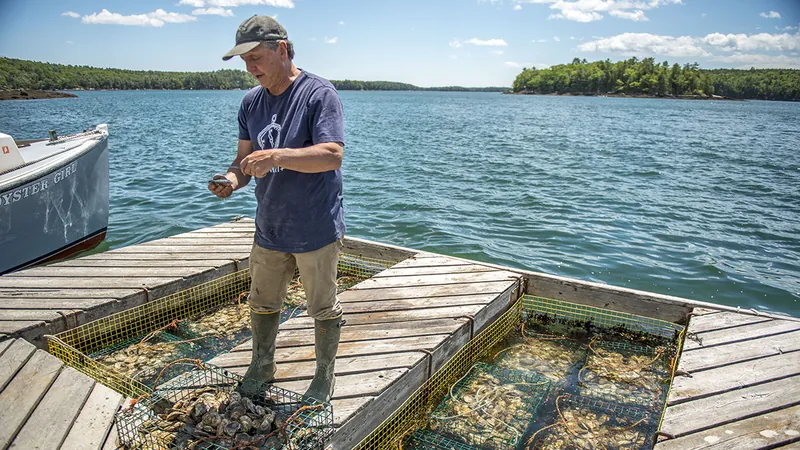
Surprising Ocean Acidification Delay in the Gulf of Maine: How Warm Waters Are Buying Time
2025-07-03
Author: Wei
A Ray of Hope Amidst Rising Ocean Acidity
As atmospheric carbon dioxide levels continue to climb, the Gulf of Maine has emerged as a surprising buffer against ocean acidification. Known for its cold waters—where carbon dioxide is easily dissolved—this region was expected to face rapid acidity increases, jeopardizing both marine ecosystems and the thriving shellfish industry.
Unraveling the Mystery of Seawater Chemistry
Understanding the chemistry of seawater is a daunting task, relying on advanced technology and a grasp of intricate physical, chemical, and biological interactions. Historically, there has been a lack of long-term data, making it difficult for scientists to monitor trends in water acidity. However, groundbreaking research utilizing nearly a century's worth of data from algae has revealed that the Gulf of Maine's trajectory in ocean acidification is temporarily stalling.
A Nearly 100-Year Acidic History Revealed
In a study published in *Scientific Reports*, researchers discovered a surprising trend. By analyzing crustose coralline algae, which can live up to 40 years and show growth bands similar to tree rings, they reconstructed seawater pH levels from 1920 to 2018. Their findings revealed a historical average pH of 7.9, with a modest increase of 0.2 pH units over the past four decades, defying the expected decline.
Warming Waters: A Temporary Buffer?
Starting around 2010, a remarkable shift occurred in the Gulf of Maine, with waters warming significantly due to a decrease in cold northern water masses and an influx of warm, alkaline Gulf Stream waters. This warmer water seems to provide a temporary buffer against rising acidity levels. However, researchers caution that this relief cannot last indefinitely.
The Looming Challenges of Ocean Acidification
While the Gulf of Maine may currently be sheltered from acidification's full impact, the long-term effects of increasing atmospheric carbon are still looming. Ocean acidification presents critical challenges to the coastal economy, particularly its commercial fisheries stretching from Cape Cod to Nova Scotia. With the threat of acidification compounding existing stressors—like disease, habitat loss, and invasive species—the region's ecosystems could soon reach a tipping point.
Understanding the Complex Dynamics of Ocean Health
The interplay of pH, temperature, and other environmental factors complicates the picture. "It's not just about pH alone; it's a combination of factors that could trigger ecosystem shifts," explained Michèle LaVigne, an ocean scientist involved in the study. As scientists strive to comprehend the myriad forces affecting ocean chemistry, they acknowledge the daunting task at hand.
This significant research highlights the balance currently maintained in the Gulf of Maine while underscoring the urgent need for continued monitoring and understanding of the future implications of ocean acidification.






 Brasil (PT)
Brasil (PT)
 Canada (EN)
Canada (EN)
 Chile (ES)
Chile (ES)
 Česko (CS)
Česko (CS)
 대한민국 (KO)
대한민국 (KO)
 España (ES)
España (ES)
 France (FR)
France (FR)
 Hong Kong (EN)
Hong Kong (EN)
 Italia (IT)
Italia (IT)
 日本 (JA)
日本 (JA)
 Magyarország (HU)
Magyarország (HU)
 Norge (NO)
Norge (NO)
 Polska (PL)
Polska (PL)
 Schweiz (DE)
Schweiz (DE)
 Singapore (EN)
Singapore (EN)
 Sverige (SV)
Sverige (SV)
 Suomi (FI)
Suomi (FI)
 Türkiye (TR)
Türkiye (TR)
 الإمارات العربية المتحدة (AR)
الإمارات العربية المتحدة (AR)